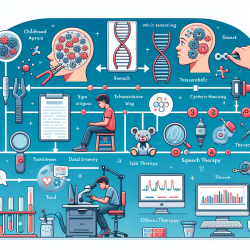Introduction
In the realm of speech-language pathology, the integration of public participation and technical expertise can significantly enhance therapy outcomes for children. The research article "Democracy underwater: public participation, technical expertise, and climate infrastructure planning in New York City" by Malcolm Araos provides a compelling case study on how these elements can be balanced effectively. Although the study focuses on climate infrastructure, its findings can be extrapolated to other fields, including speech-language pathology, to improve practitioner skills and outcomes.
Key Insights from the Research
The study highlights the paradox of increased public participation not necessarily translating into greater democratic decision-making power. This phenomenon is observed when technical expertise is used to override public input, as seen in the East Side Coastal Resilience Project. The project initially involved extensive public participation, but a shift to a technocratic decision-making style led to public dissatisfaction and conflict.
For speech-language pathologists, this underscores the importance of balancing public input (from parents, teachers, and the community) with technical expertise (from clinicians and researchers) to create effective therapy plans. Practitioners can draw parallels between the study's findings and their own practice by ensuring that public input is genuinely reflected in therapy decisions, thereby enhancing legitimacy and satisfaction among stakeholders.
Implementing Findings in Speech-Language Pathology
To integrate these insights into practice, speech-language pathologists can:
- Engage Stakeholders: Involve parents, teachers, and other community members in the therapy planning process. This can be done through regular meetings, feedback sessions, and collaborative goal-setting.
- Reflect Public Input: Ensure that the input from stakeholders is visible in therapy plans and outcomes. This can be achieved by documenting changes made based on feedback and communicating these to all parties involved.
- Balance Expertise and Participation: While technical expertise is crucial, it should not overshadow the valuable insights and experiences of those directly involved with the child. A balanced approach ensures that therapy plans are both evidence-based and contextually relevant.
Encouraging Further Research
Speech-language pathologists are encouraged to delve deeper into the intersection of public participation and technical expertise. By conducting research in their own settings, practitioners can explore how these dynamics play out in speech therapy and identify strategies to optimize outcomes for children.
Further research could focus on the following questions:
- How does public participation influence therapy outcomes in different settings?
- What are the best practices for integrating stakeholder input with clinical expertise?
- How can technology facilitate effective communication and collaboration among stakeholders?
Conclusion
The insights from the "Democracy underwater" study provide valuable lessons for speech-language pathologists. By effectively integrating public participation with technical expertise, practitioners can enhance the legitimacy and effectiveness of therapy plans, ultimately leading to better outcomes for children. Embracing a data-driven approach that values both stakeholder input and clinical expertise is key to achieving this balance.
To read the original research paper, please follow this link: Democracy underwater: public participation, technical expertise, and climate infrastructure planning in New York City.










